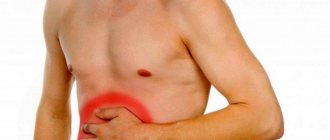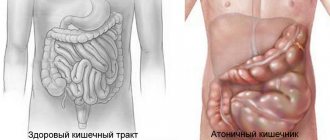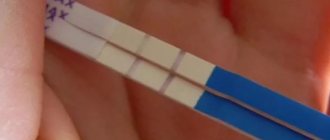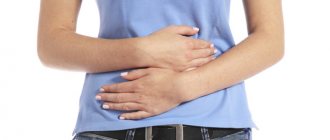Pain in the stomach (gastralgia) has many characteristics. One of them associates the onset with the time of eating: during meals, immediately after (early), after some time (late). Depending on how many hours have passed since the start of digestion, “hunger pain in the stomach” is distinguished. This means the absence of any products in the organ cavity.
Patients talk about painful spasms “on an empty stomach.” The feeling of hunger accompanies gastralgia, but does not mean a sharp increase in appetite. This is not the constant hunger that patients with endocrine obesity experience or people trying to use low-calorie diets based on prolonged fasting to treat diseases.
It’s just that such pains are well relieved with a light snack. In any case, it must be taken into account that a healthy person should not have any discomfort in the stomach area. If they appear, then you should understand the reasons and identify the disease as early as possible.
Is it worth using fasting for gastritis?
Just left the table, and your hand again reaches for the refrigerator, what could you throw into your insatiable womb?
So what are the possible reasons for constantly feeling hungry, even after a hearty meal? The main ones are non-compliance with the diet and nutritional rules, although health complications cannot be ruled out. More details below. Complete refusal or meager breakfast
Morning meal is very important for a person. It is at the beginning of the day that metabolic processes are launched and the functions of each organ are activated. The nutrients received normalize the amount of sugar in the blood, so you stay full for a long time and can work calmly without experiencing discomfort.
Not enough water
The body needs water for digestion processes. And it doesn’t matter that you ate soup, meat with gravy and washed it all down with compote. This liquid doesn't count. You need simple water (spring water is better, but if you don’t have it, regular, boiled water will do). It is necessary for removing salts, toxins, and deposits, which are especially abundant after eating.
You need to drink a lot during the day, at least 2 liters, so that unnecessary things are carried away with water and cleansing occurs.
Eating prepared foods and semi-finished products
Ready-to-eat products are packed in bright little bags and bags stuffed with aroma and taste enhancers. That is, a complete set of chemicals that will not fill you up.
Ideally, cook it yourself. Then you will always know what is “floating” in your pan. But if this is not possible, try to choose from ready-made products those that are least harmful (if possible).
Ordinary food, without any frills, will bring more satiety than a “sophisticated” culinary miracle.
Diet too sweet
Not only do sweet drinks and baked goods contain an incredible amount of calories that are deposited on the sides and waist, but there is also added sugar, of which there is a lot, and corn syrup (an unhealthful substance) depresses the brain areas responsible for appetite. There are no signals that you are full. The consequence is a constant desire to eat more.
It is worth reducing your sugar intake as much as possible, in particular dessert drinks.
Strict diet
You shouldn’t force yourself into a narrow framework, not allowing you to try an extra piece. Exorbitant prohibitions only make the desire to eat something tasty only grow. It is necessary to reconsider the meal schedule so that there are at least three of them during the day. And if you still can’t stand it from lunch to dinner, add an afternoon snack.
Avoid snacking on the go, but cutting out food altogether is a bad decision. Without preparation, this can ruin your stomach. It's better to take the path of healthy change slowly.
Monotonous food
Nutritious, varied foods bring pleasure and fill you up more quickly. Make sure that you have proteins, fats and carbohydrates on your table without bias towards one of them. Also, if the menu has the same dish every day, the body will rebel and refuse to give signals of satiety, wanting change.
Alcohol
Abundant “libations” slow down the work of saturation centers. Appetite increases and, what is most dangerous, a person begins to eat everything uncontrollably, forgetting about the diet and the desire for a healthy lifestyle. The bar falls, all achievements become a thing of the past. Therefore, if you want to become slim, lose extra pounds, and regain your attractiveness, then it is better to give up alcohol altogether.
Nocturnal lifestyle
In sleep, our body continues to live. Some functions are slowed down, others are activated. And there are processes that occur only at night.
Exclusively after sunset, the glands begin to produce melatonin, a hormone responsible for sleep.
What is he doing?
- promotes the effective functioning of the endocrine system;
- inhibits the aging process;
- helps adapt to time zone changes;
- increases immunity;
- creates an antioxidant effect;
- protects against stress, seasonal depression;
- stabilizes blood pressure, strengthens the cardiovascular system;
- participates in digestive processes;
- affects the amount of other hormones;
- has a beneficial effect on brain cells.
This is why it is important to fall asleep before midnight. The ideal time is 22 hours. During this period, the production of melatonin is activated, which helps maintain figure and beauty.
During its activity phase, it interacts with other hormones (ghrelin, leptin, insulin), which are responsible, along with other functions, for appetite and body fat. Ghrelin activates the desire to eat. Before eating, its level increases, and after eating it decreases. The less you sleep, the more you want to eat. Leptin causes satiety. Melatonin inhibits the production of ghrelin and complements leptin.
Melatonin is naturally produced only at night. As the illumination decreases, it becomes more abundant, we begin to chow, yawn, and dream of lying down on a pillow. Its increasing concentration motivates us to go to bed so as not to interfere with the night's recovery processes with untimely activity. Peak production is midnight. By this time it is advisable to sleep soundly.
A lack of melatonin results in accelerated aging, disruption of the fat burning process, leading to obesity, and accumulation of free radicals, which increase the risk of cancer.
This is why proper sleep patterns are important.
Constant stress
Eating troubles with sweets and tasty things is the body’s need for pleasure. The more experiences, the more actively the stomach asks for rewards.
The way out is to get rid of addiction, realizing that stress will not be eliminated with an extra piece of the pie. Achieve harmony in life.
Often hands reach out for treats from idleness, just to have something to do. The mouth chews incessantly, although there is absolutely no physical need for this.
Planning your day will help you get rid of this situation. You must be busy all the time. Fill your days with exciting events: meet friends, create new projects, go to exhibitions, help others.
Thoughts about food will dissolve in a string of interesting things and worries.
Mental load
Intellectual work takes a lot of energy. With brain activity, blood glucose levels decrease. Therefore, having worked hard with your head, sometimes you experience emptiness in your stomach. But this is not a physiological need for all organs, but only for the brain. Such discomfort is easy to correct.
It’s enough to eat a spoonful of honey and crush some nuts, and the sensations will even out, you will feel completely fine.
When you feel hungry after eating, and this happens with frightening consistency, it’s a reason to worry. Regardless of whether you are a woman or a man, this behavior of the body can signal a developing disease. There is no longer any time for figure and extra pounds when it comes to health.
Be sure to pay attention to your health if you:
- a heavy meal does not bring a feeling of fullness. According to nutritionists, a full dinner should make you forget about hunger for at least five to six hours;
- in the afternoon it is especially difficult to resist the desire to eat, and in the evening it’s as if the gluttons attack;
- you are constantly thirsty, regardless of whether you have eaten salty foods or not.
The presence of these symptoms may indicate improper processing of sugar by the body and the risk of developing diabetes.
If you feel an insatiable, frequent desire to eat, your stomach hurts, or you are tormented by constant thirst, you should visit a doctor and check your blood sugar levels.
Hunger can be caused by genetic disorders. For some reason (there was a malfunction in the functioning of genes), the brain stopped receiving signals about satiety. He has a program running: “We need to eat!”, but there is no one to turn it off.
Hormonal changes can also affect the desire to eat. Many women know how difficult it is to control themselves during menstrual periods, and it seems that there is a hole in the “stomach” that cannot be filled with any culinary delights. Everything falls like into an abyss.
The problems listed above should be dealt with by a specialist; traditional methods and self-medication are powerless in this case.
Another difficulty that cannot be dealt with alone is deep mental disorders provoked by stress and depression. A person does not feel full due to nervousness, absorbing an enormous amount of food, sometimes to the point of nausea.
Lack of microelements and vitamins also activates the desire to eat. For example, the disadvantage:
- calcium causes a craving for eating lard, oil, fatty foods;
- sodium, chlorine - herring, pickles, anything with more salt;
- phosphorus, chromium, sulfur - provokes cravings for sweets.
If you notice that while following a proper diet, you often experience “emptiness” in your stomach, do not harm your body - undergo a medical examination and take the necessary tests.
The first thing you need to do is figure out what its source is.
- A disease means you should see a doctor and get treatment;
- Psychosomatics – get rid of stress, groundless fears, come out of the shadows onto the bright side of life;
- Violation of the regime - try to comply with it, adhering to a healthy lifestyle.
If all of the above does not apply to you, but the feeling of hunger still does not go away, depriving you of peace, try to fight the bad habit of continuously chewing, using psychological tricks. This will help trick the brain and reduce the feeling of emptiness in the stomach:
- eat food while sitting, slowly, without a book or TV;
- consume food consciously, chewing slowly, this way satiation occurs faster;
- use small plates, so the portions will seem larger;
- give up spices that stimulate the appetite, but lay out the dish beautifully and decorate it.
Herbal decoctions of mint, parsley, fig compote, and plums help suppress the appetite.
After each meal, rinse your mouth with mint mouthwash.
Before going to bed, if you feel a lot of pain, drink warm water with a spoon of honey. This will give a feeling of fullness in the stomach, and glucose, once in the blood, will signal the brain about satiety.
Try to fill your free time with important things so that you are distracted and forget about food.
Fasting is unacceptable when the body is exhausted, when there is a sharp limitation of vital resources; during antibiotic therapy for the treatment of microbial forms of gastritis
Painful sensations in the morning
Morning hunger pain is the main sign of the development of a duodenal ulcer. Most often, the first uncomfortable, painful sensations in the morning force you to get out of bed very early and drink a glass of water or warm milk. This technique will really alleviate the condition, but it may return periodically. Vomiting also helps relieve painful spasms in the morning; after this, excess hydrochloric acid in the stomach is neutralized, and the internal nerve roots become less irritated.
A visit to a specialist will help establish the correct diagnosis, and timely drug treatment will quickly relieve the unpleasant problem and the cause of this condition in the morning.
Conditions in which you constantly want to eat
- With pathologies of the central nervous system, almost constant irritation of the hunger center can occur. In this case, an integrated approach to treatment is required, and it should be carried out by a qualified specialist.
- When there are disturbances in the functioning of the endocrine system, the feeling of hunger is associated with hormonal imbalance. The hormone leptin - the so-called satiety hormone - in optimal quantities ensures a normal effect on the energy, metabolic and neuroendocrine reactions of the body. With its excessive or insufficient production, disturbances occur, leading to a constant feeling of hunger and other unpleasant symptoms.
- A deficiency of certain vitamins can also provoke an uncontrollable desire to eat. A lack of a number of vitamins, especially those belonging to group B, leads to deterioration of the condition of the skin, nails, hair, and also leads to increased appetite. With vitamin deficiency, there is a desire to replenish the supply of nutrients, so the person wants to eat.
- An indomitable appetite often manifests itself in those who adhere to low-carbohydrate diets. Simple carbohydrates are the main food for the brain. As a result, their absence leads to a lack of brain nutrition, which affects the body as a whole. The brain constantly requires replenishment of such a deficiency, and during a low-carbohydrate diet, those losing weight feel intense hunger and crave sweets.
- Increased appetite may be associated with a drop in blood glucose, which occurs due to a number of physiological or psychological problems. If an imbalance of glucose and insulin occurs over a long period of time, it can lead to the development of diabetes. And the constant desire to eat something leads in such a situation to the development of obesity, which is also a harbinger of diabetes.
- Sudden changes in diet associated with the transition to a diet, healthy eating, etc., cause a restructuring of the digestive system, which, in turn, can cause a feeling of hunger.
- This also happens with significant restrictions in the amount of food. It is quite natural that, without receiving enough food, a person feels hungry. In such a situation, it is recommended to eat as little and as often as possible.
- If a person is regularly stressed, this can also lead to a persistent desire to eat a lot. When the nervous system is excited, there may be a desire to “eat” stress. If you constantly follow it, persistent “stress-eating” connections may arise, which will subsequently require the help of a psychologist.
- Attacks of unreasonable appetite also appear during increased mental stress. People engaged in heavy mental work very often eat chaotically, without adhering to a regimen at all. Instead of full meals, they eat snacks. As a result, this leads to a desire to eat within a few minutes after the next snack. To break the vicious circle, you will have to establish a clear diet with four full meals and no snacking on unhealthy foods. If you want to kill your hunger with something, fruits or dried fruits are suitable.
- Often adhering to a variety of diets, a person “tunes” the body to a food shortage regime. But the body constantly demands to replenish reserves, and, as a result, the person losing weight is bothered by the constant desire to eat. To avoid this, it is necessary to practice a complete healthy eating system, rather than short-term diets.
- If there is a lack of certain substances in the body, the feeling of hunger can also appear almost constantly. We are talking about vitamins and microelements. For example, you may crave sweets due to magnesium deficiency. In this case, it is necessary to conduct medical research and adjust the diet so as to compensate for the lack of substances.
- In women, attacks of uncontrollable appetite may appear during premenstrual syndrome. A couple of days before the start of menstruation, many women have an irresistible desire to eat something and does not disappear even after the woman has had a snack. This symptom is associated with a lack of the hormone estrogen in the body. These days it is recommended to eat less baked goods and sweets. It is also important to drink a lot of water and eat fruits and vegetables.
During pregnancy, a global restructuring of the female body occurs. At the same time, very sharp changes in hormonal levels occur, as a result of which many expectant mothers feel an indomitable appetite.
However, the expectant mother should know that an increased appetite may signal a lack of vitamins, calcium, iron, magnesium, etc. in her body. Therefore, it is very important to take care of the most balanced diet - with a sufficient amount of vegetables and fruits. You also need to take vitamin complexes.
If the desire to eat is accompanied by constant nausea, this may be due to various diseases. This often indicates hypoglycemia, when plasma glucose levels are very low. The body tries to compensate for this deficiency with food, especially sweets. This condition needs to be treated.
However, such symptoms can be evidence of other diseases. Therefore, such symptoms should be a reason to consult a doctor.
For gastritis
The desire to eat can be triggered by increased acidity in hyperacid gastritis. People with this diagnosis often experience sucking pain in the pit of the stomach. They subside when a person eats at least a little. Similar symptoms may also be evidence of other gastrointestinal diseases. Therefore, it is important to clarify the diagnosis before starting treatment.
If some babies are very difficult to feed, then it also happens that the child asks to eat almost constantly. If a child does not reach the saturation phase, this may indicate disturbances in the gastrointestinal tract or a failure of metabolic processes. A baby who eats a lot may have a very large stomach.
Having determined the cause of such disorders, the doctor will prescribe treatment and the right diet. But in this case, the parents themselves should follow the advice of a specialist. First of all, the child should eat 4 times a day, without snacks in between. If you can’t do without them, you need to give your baby vegetables and fruits.
Causes
Hunger pain in the stomach can occur for a number of reasons. Experts have identified the main factors leading to this condition:
- increased stomach acidity;
- spasms localized around the affected area of the stomach;
- improper gastric motility;
- increased irritability of receptors where an ulcer begins to appear in the stomach.
To relieve the first symptoms, specialists prescribe a number of medications, but at the same time the patient must undergo a full examination, which begins with gastroscopy. After making an accurate diagnosis, the doctor begins to work with the root cause of this condition, facilitating and accelerating the process of recovery and recovery. An advanced disease will be much more difficult and longer to treat.
The process of preparing the body for hunger
They begin the preparatory stage long before the start of strict abstinence from food, on the first day of entry it is necessary to completely remove all fish and meat from their diet, seafood is also prohibited. They begin the
preparatory stage long before the start of strict abstinence from food, on the first day of entry they must completely remove it from their diet all fish and meat, seafood is also prohibited, but you should not remove dairy products and all plant ingredients just yet. Next, you will have to give up all confectionery and flour baked goods; these products take a long time and are difficult to digest, for this reason they are removed from the menu first.
On the third day, only light types of products remain on the menu; all ingredients must simply be digested in order to spare the gastric mucosa; if you eat plant-based foods, they must be boiled or baked. It is allowed to supplement the diet with various fermented milk products, but they should not have a high percentage of fat content.
On the fourth day of preparation, it is worth replacing two meals with a fermented milk drink, then on the fifth day it is allowed to eat any vegetables, stewed and baked, on the sixth day the patient should drink kefir and eat cottage cheese with low fat content. The seventh day of the diet includes only eating light low-fat kefir, and then you can start fasting.
Diagnostics
If your stomach hurts, do not delay visiting the doctor. The following tests will be ordered to identify the cause:
- clinical blood test;
- clinical urine analysis;
- liver tests (for differential diagnosis with liver pathology);
- fecal elastase (to exclude chronic pancreatitis).
Instrumental studies include:
- Ultrasound of the abdominal organs;
- X-ray contrast examination of the stomach with a barium suspension (in case of an ulcer – uneven contours of the organ with a “niche symptom”). This study has no advantages over fibrogastroduodenoscopy (FGDS) and is performed if it is impossible to do the latter;
- FGDS with taking a biopsy of the mucous membrane in the area of the ulcerative defect.
Fibrogastroduodenoscopy
When identifying an ulcer, it must be remembered that this is a lesion that most often occurs in the presence of Helicobacter pylori infection. Therefore, tests are also carried out to detect it:
- urease breath test;
- PCR of stool to detect its antigens;
- serological blood test to detect antibodies to Helicobacter.
Treatment can be prescribed only after a series of studies have been carried out and the etiology of this symptom has been clarified.
Which doctor should I contact?
If hunger bothers you almost constantly, this is either a physiological or psychological problem. Accordingly, you need to contact either a gastroenterologist, or a psychiatrist or psychologist. You may also need to consult an endocrinologist. Perhaps a nutritionist can help solve the problem.
But first of all, you need to contact your local doctor, who will help you determine which specialist you should contact next.
If the patient has not been diagnosed with serious pathologies, the nutritionist can give him the following advice:
- Introduce more fiber-rich foods into your diet.
- Try to drink mineral or regular water during attacks of hunger to quench your appetite.
- Chew food thoroughly and very slowly. In the process of slowly eating, the stomach will have time to send a signal to the brain that it is already full.
- You should not eat in front of the computer or TV, but in appropriate places.
- During the diet, you should not restrict the body too much.
- After you are full, you need to get up from the table so as not to overeat later.
- Remove foods that stimulate appetite from the menu - spicy, salty, alcohol, etc.
- Do not leave tasty things within reach, so that during work you will not have the desire to snack.
- Try to keep yourself busy with interesting and exciting things so that you forget about food. The interval between meals should be about four hours.
Why do hunger pains occur?
This type of pain syndrome usually indicates the localization of the pathological process in the lower part of the stomach (its antrum and pylorus) and/or duodenum. It can become one of the manifestations of simple or erosive gastritis, duodenitis, gastroduodenitis, or peptic ulcer disease, in which the defect in the organ wall is localized in the above areas.
No feeling of hunger
However, the opposite situation is often observed - a person has a lack of appetite, which also indicates disturbances in the body. If there is no desire to eat even after a long break between meals, problems with various systems and organs are likely. Why the healthy feeling of hunger has disappeared, you need to find out by visiting a doctor.
Despite the fact that many people at first consider a decrease in appetite almost a gift from above, since it helps to lose weight, such a symptom cannot be ignored. If the body does not receive vitamins, minerals and other beneficial substances for a long time, this will soon have a detrimental effect on well-being. Complaints like: “I don’t feel hungry” should initially be expressed to a therapist, who will refer you to more specialized specialists.
Dysrexia is a general term for appetite disorders. One of the most common appetite-related disorders is anorexia, a condition in which there is no appetite at all.
There are many reasons why this phenomenon occurs. This can be either a consequence of stress or depression, or a hormonal disorder.
Sometimes short-term appetite disturbances are easily eliminated. It is enough to drink tea with mint, lemon balm, chamomile for calm, or a collection of herbs that stimulates appetite.
However, loss of appetite accompanies many diseases. Among them are dysfunctions of the thyroid gland, autoimmune diseases, infectious diseases, oncological processes, diseases of the digestive system, liver, kidneys, heart, etc.
Many expectant mothers experience worsening appetite already in the first trimester of pregnancy, when toxicosis begins. In this state, a woman needs to listen to her body and eat what she wants. Appetite disappears due to lack of iron and folic acid. Therefore, it is advisable to replenish the supply of these substances by eating cabbage, buckwheat, and green leafy vegetables.
If there is no appetite immediately before the main meal, this may be due to the fact that the person is simply not eating properly. Perhaps snacking on high-calorie foods simply discourages you from eating.
Also, poor appetite may be due to a lack of B vitamins and zinc. In such a situation, you should take a multivitamin complex and consume more foods containing such elements.
Diseases of the digestive system... We'll tell you everything you want to know about them.
Pain in the stomach, or gastralgia, accompanies a number of diseases of this organ. When characterizing them, a person, as a rule, points his hand to the epigastric region - the upper part of the abdomen in the middle. One of the characteristic signs of pain in pathologies of the stomach or duodenum is its clear connection with food intake. Thus, early, late and “hunger” pains are distinguished. It is their last option that we will talk about in this article.
Side effects
During fasting, the body's activity decreases and a person may feel unwell. In most cases, the symptoms that appear during this process are a normal reaction and go away on their own after 2-3 days. The patient may experience the following symptoms:
- severe hunger, which usually goes away after a day or two. Then this feeling wears off and doesn’t bother you much;
- pain in the abdomen. In the first days they are weak, then completely disappear;
- general weakness, fatigue, decreased activity. These symptoms disappear after 2–3 days, after which the person may feel a surge of energy;
- nausea, unpleasant taste in the mouth;
- headaches, dizziness. It is recommended to spend time in the fresh air and take a walk.
What will happen if left untreated?
The pathological process, accompanied by “hunger” pains, will gradually progress, one disease will transform into another, and complications will arise. Thus, the erosion will become deeper and deeper and one day form an ulcer, which may subsequently be complicated by bleeding, perforation, or even transform into a malignant tumor. It is easier to eliminate any disease at an early stage than at the stage of complications.
End of the procedure
First, you need to introduce semi-liquid porridges and slimy soups into your diet. Then, after 1-2 days, boil or steam vegetables. After this, you can add fermented milk products and, lastly, meat and fish.
Nutrition during the treatment period must comply with the rules of the diet. You need to eat in small portions, several times during the day. Fatty, spicy, salty foods are excluded from the diet. The menu should be balanced and contain natural, healthy food. You should follow these rules after treatment if you want to cure gastritis forever.
Before starting therapeutic fasting, consult your doctor. If he believes that this procedure is possible, do it taking into account all the recommendations.
- How to suppress hunger while dieting
Menu (Power Mode)
Doctors prescribe a course of treatment, which includes a special, strict diet. This helps you recover faster. Eating according to a regimen and observing restrictions prevents the development of serious diseases.
Nutritional Requirements:
- Eat food often, in small quantities.
- Minimize the intake of salt into the body.
- If the disease is in an advanced state, the diet consists of natural cereals.
- Avoid fried, unhealthy foods and spices that disrupt the functioning of the mucous membranes.
- If you have pain at night, you should radically change your diet. Do not eat food before bed. The last intake of food into the body is three hours before bedtime.
- You should not have light snacks for fear of making your condition much worse.
- It is prohibited to consume sweet bars. Replace chips and crackers with dried fruits, pumpkin seeds, and homemade crackers.
- You can’t follow diets to lose weight, they worsen the condition of the body.
Doctors advise starting treatment on time, eating right, and be sure to maintain constant monitoring.
The menu for hunger pain is formed from a list of permitted products based on Treatment Table No. 1 and its varieties, which can be changed taking into account the form and stage of the disease and the patient’s well-being. It is important to follow the recommended principles of heat treatment of foods and the diet option (with pureed/unprocessed) dishes.
Effective treatment
Hunger pains, signaling diseases of the gastrointestinal tract, must be treated as soon as possible, before the disease reaches the chronic stage. The specialist approaches the problem comprehensively, this allows you to get the desired result in a short time and improve the patient’s well-being.
- Therapeutic measures begin with normalizing the functioning of the stomach with the help of medications.
- At first, painkillers help relieve painful spasms, but gradually you will need to give them up so that addiction does not occur.
- Specialists prescribe medications that help regulate the amount of stomach acid produced.
- Painful spasms are relieved with prescribed antispasmodic drugs.
- In addition to the necessary list of medications, antibacterial drugs that kill Helicobacter bacteria are also added.
- Additionally, in the morning before meals you should drink a glass of still water or milk. The liquid will reduce the acidity level in the stomach by diluting the hydrochloric acid.
Symptoms
The mechanism of development of hunger pain in the epigastrium has long been known. Under the influence of the reasons described above, gastric peristalsis (that is, contraction of its walls) increases significantly, which stimulates impulses in the medulla oblongata.
Painful sensations can occur at different times of the day. Thus, with a duodenal ulcer, especially intense hunger pains begin closer to the night, which is why patients are literally drawn to the refrigerator. Fasting only increases the severity of painful sensations, so with this disease there may be pain in the morning.
With chronic gastritis, there is no pattern in the occurrence of discomfort - it can occur at any time.
Patients often note a number of additional symptoms:
As a rule, in addition to the fact that the patient is bothered by hunger pain in the stomach, it is also possible to identify the accompanying symptoms. Most often, such people will complain about:
Patients may also note that first there is a feeling of discomfort in the epigastric region, often on the left, and only then there is pain in the stomach.
The very nature, time of occurrence and duration of the pain syndrome can lead the doctor to think about the likelihood of a specific disease.
Authorized Products
Dietary nutrition for hunger pain allows the inclusion in the diet of:
- white crackers, day-old/dried white bread, biscuits;
- dietary meats (chicken, lean beef, turkey, rabbit), unsalted ham, lean fish (pike, carp, pike perch);
- soft-boiled eggs, steamed omelet;
- cereals (buckwheat, semolina), vermicelli, white rice;
- boiled vegetables (potatoes, cauliflower, pumpkin, beets, zucchini, carrots;
- vegetable oil/unsalted butter (added to dishes on the table);
- sweet berries and fruits (jelly, jelly, compotes, marshmallows) and drinks - fruit jelly, compote, mineral water, weak tea with milk.











